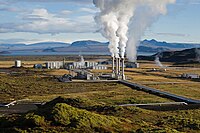
Photo from wikipedia
Geosciences and a low‐carbon economy By providing solutions for harnessing subsurface resources, the geosciences will emerge as a critical component of an efficient transition to a low-carbon economy. In particular,… Click to show full abstract
Geosciences and a low‐carbon economy By providing solutions for harnessing subsurface resources, the geosciences will emerge as a critical component of an efficient transition to a low-carbon economy. In particular, the potential for geothermal energy to supply clean base-load energy for heating and electricity worldwide is enormous. If developed appropriately, this georesource will play a decisive role in the global switch to renewable energies. Geothermal energy exploitation has a strong history in Europe and is a key part of several municipal, national, and European low-carbon energy strategies.1 Through the deep geothermal pilot programme at Soultz-sous-Forêts (France) and the recent success of EGS2 sites at Rittershoffen (France) and Insheim (Germany), academic and industry leaders have demonstrated that geothermal energy generation is technically achievable even in low-permeability rocks. The economic viability of deep geothermal energy production in low-enthalpy regions has been verified by numerous geothermal heat plants in the Paris Basin (France), as well as the Molasse Basin (Southern Germany). However, geothermal energy for heat and power production remains novel, as opposed to the norm. The complexity of the exploitation process requires the active participation of experts from a variety of fields. Indeed, key to the development of efficient and sustainable geothermal energy is the pursuit of new integrative approaches. Incorporating geothermal energy into the mainstream of energy production and use requires scientific and technical advances that reduce the cost and risk associated with resource exploration and extend the life of reservoirs and geothermal plants, while working with communities to assess and mitigate environmental risk.
Journal Title: Geothermal Energy
Year Published: 2020
Link to full text (if available)
Share on Social Media: Sign Up to like & get
recommendations!